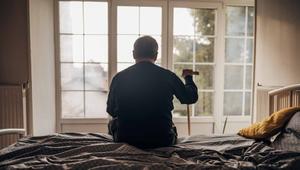Dan Witters, research director for the Gallup National Health and Well-Being Index, joins the podcast to discuss the state of loneliness in the U.S. Which groups are struggling most? And how does loneliness impact our wellbeing? Later, Gallup’s Lydia Saad and Jeff Jones give an update on Americans’ attitudes toward the pandemic.
Below is a full transcript of the conversation, including time stamps. Full audio is posted above.
Mohamed Younis 00:12
For Gallup, I’m Mohamed Younis, and this is The Gallup Podcast. In this episode, we discuss the state of loneliness in America. Is it on the rise or the decline? And how does loneliness really impact our overall wellbeing? Dr. Dan Witters is Gallup’s research director on wellbeing. Dan, welcome back to the show, sir.
Dan Witters 00:30
Thanks, Mohamed. Always happy to be here.
Mohamed Younis 00:33
Let’s start by looking at the country overall. Has loneliness in general here in the U.S. been on the rise or the decline, per our latest data?
Dan Witters 00:41
The good news is that loneliness is on the decline. The bad news is it's still pretty high. If we go back to the spring of 2020, all the way up kind of through the first quarter of 2021, about 23%, 24%, up to 25% of American adults were experiencing a lot of loneliness. Since the vaccine era kind of kicked in and a greater return to openness and normalcy in, in everyday life, that loneliness rate has come down to 17%. So that's the good news. The bad news is that 17% is still about 44 million American adults. So it remains a big issue, just not as bad of an issue as it was.
Mohamed Younis 01:27
And it is, it's so easy to kind of overcelebrate the decline and lose sight of the fact that, yeah, 44 million people are still expressing, at least in our surveys, that they're experiencing loneliness. How do we measure loneliness, Dan, in our survey? Because it's not about aloneness. It's not about being alone or being apart from others; it's really a perception more than an emotion.
Dan Witters 01:50
Yeah, exactly. And, you know, you, you ask the question different ways, you can get different estimates, right? And, and the way that we do it is a so-called day-reconstruction method. We’ll, we won't ask people, “Do you feel lonely generally?” or “Are you a lonely person?” What we’ll ask folks is, “Did you experience loneliness a lot of the day yesterday?” So we're bypassing memory and recall and just having people think about the previous full day. Did you have significant loneliness throughout the day? That's a good way to do it, because in practical terms, it gives you a read on the percentage of American adults on any given day that are really, being encumbered by, by loneliness.
Mohamed Younis 02:33
Asking it the same way for such a long period of time also gives us a great metric to really understand if it's on the rise or the decline. And, and as we found, as you just explained, it was on the decline in our last reading, but it wasn't equally on the decline among all groups across the population. Were there particular communities or populations that you saw that decline a little bit less effective on?
Dan Witters 02:55
We don't find much of a difference in gender, for example; men and women report loneliness at about the same rate. But we do find that the lower the income and the younger the age, the loneliness is, is higher. And that holds consistently over time -- quite a bit higher than their higher-income or older counterparts. Now, with that being noted, as these rates have declined, they've come down across the board for pretty much every subgroup that we've looked at. But those young folks and the low-income folks -- they tend to be related with each other -- have come down more than the other groups have. So, so if you, if you look at the real low-income Americans, under $24,000 per year in annual household income, compared to higher-end $180,000+, what we find is, is that while the $180,000+ came down, the low-income has come down quite a bit more. And that indicates to us that those young folks and the low-income folks were probably the ones that were most harmed by COVID-19 from this, an important aspect of emotional health.
Dan Witters 04:10
If you look a little deeper, Mohamed, I think a lot of that has to do with marital status. Marital status is a really, really big, important factor in wellbeing. People who are married after you control for things like income and age and other factors that are relevant, those who are married have quite a bit better wellbeing than do singles, than do those who are divorced, than do widowers. And, and if you're separated, you really have low wellbeing. And that, and we see that kind of playing out with loneliness. People, so the COVID-19 hits. The economy shuts down. A lot of people get sent home and have to work from home. There's all the social isolation policies going on. If I've got a spouse or a domestic partner at home, my loneliness is far lower than the folks who don't. And so as, as you've gotten that reopening taking place, it's kind of taking that pressure off of the folks that are just home, home alone.
Dan Witters 05:11
I think the other factor that's a little bit tougher to quantify, but I believe that that's also what's going on in here, is those lower-income and younger folks are much more likely, as you know, to have been among those 22 million who lost their jobs back in the spring of 2020. And unlike older higher-income professionals like you or I, who get sent home but can still collaborate on a daily basis, on screen with our coworkers, these folks didn't have that advantage. They're in jobs that just simply got cut, and there was, there was nothing to do but go home. And if you're, if you're single, it's really gonna drive the loneliness. So those groups, the loneliness has come down; it's come down more than for the others, but it still remains higher for them.
Mohamed Younis 06:01
And it’s really important, and I’m happy you highlighted those correlates between loneliness and income and these other variables. When we talk about, though, the impact of loneliness on our overall wellbeing, how do we get our minds around it as a factor? I know, you know, obviously just thinking about mental health and, and, emotional wellbeing, we think a lot about stress having an impact. How do you get your mind around the impact loneliness has on wellbeing?
Dan Witters 06:30
It’s kind of an unholy quadrangle -- depression, loneliness, sadness and anger. Those four really go together. Others get mixed in, too, of course, but those are the, those big, those four really play off of each other. They’re highly reciprocal, so each will influence the other. If I’m carrying around a lot of, if I’m clinically depressed, I’m going to be less likely to be out making friends, thus driving loneliness. On the other hand, if I don’t have folks that I can turn to and am lonely, that’s going to increase the probability that I’ll become depressed. The, so when you, when you kind of break those down, people who currently have or are being treated for depression are almost three times more likely to report loneliness than those who don’t -- it’s about 33% to 13%. If you look at the anger and the sadness, it’s about a 6-to-1 ratio, people that are experiencing a lot of anger the prior day, two-thirds of them, Mohamed, are also experiencing a lot of loneliness.
Dan Witters 07:38
These things, you know, they, they have a real cascading effect; they have an additive effect on each other; and they can really get in the way. Loneliness, like depression, it’s just a killer for wellbeing. It gets in the way of everything important in life, and you see real close associations between those.
Mohamed Younis 07:57
I'm so happy you, you went into that, Dan, because people that don't know us too well as Gallup, they think we, our minds are all in the politics and the, and the economics and what's happening, you know, on the exciting social changes taking place. But one of the most foundational social changes really taking place in our society in our time is this increased awareness around emotional wellbeing, mental health, and you just mentioned, you know, depression, loneliness, sadness, anger. I want to remind everybody listening that if you are struggling with these things, you should reach out for help. There's so much more help out there than there was when I was coming up, and we should do that. But from a social researcher perspective, Dan, what have the data shown can help with folks experiencing high levels of loneliness? Have we ever done research to kind of understand what are the activities or experiences that would help somebody be less likely to experience loneliness, the next time we ask them that question in a survey?
Dan Witters 08:53
That's a really big and an important question. There are very real and tangible ways that you can mitigate loneliness. Some of them are kind of, kind of sneaky. One, for example, is finding an accountability partner in health. This is, has really good ramifications for my physical wellbeing. It's a part of social wellbeing. But if I have somebody that is my accountability partner, that's, that's making sure that I'm eating right or exercising right, that really, really plays a big role in mitigating loneliness. Another big one -- again, kind of sneaky -- is, is using my strengths every day. If I'm in a role where I get to use what comes best naturally to me, the things that help me get through the day the best in, in terms of my innate talents, that substantially increases the chances that I am forming connections with others, both professionally and personally. And it, and it takes the edge off that loneliness. It, it decreases the chances that, that I'm gonna be suffering loneliness on any given day.
Dan Witters 10:01
Probably one last one that I would call out is just moving my body. That's physical wellness. It, it feels a little bit disconnected from an emotional health metric. But if I move my body naturally -- if I'm taking the stairs instead of the elevator; if I'm walking instead of riding in a car -- those things have a, have a real significant impact on my psychological health. And one of the outcomes of that psychological health is it, is it keeps me open to forming connections with others and making friends and reducing the chances that I'm lonely. So that's a real smart one.
Dan Witters 10:38
Finally, I think the last one that I would mention, that's just kind of inside the workplace, is, is the critical role that the manager can play. Managers, they're not necessarily supposed to be your best friend, and they're not there meant to fix whatever loneliness issues that you have. That's not their job. But great managers understand that one real critical aspect of having a highly engaged team, a highly engaged workforce is laying the foundation for close, enduring best friends to form inside of the workplace. And there's very simple things that you can do just to get people together -- have group lunches, have outings together. When, when you have that in place, folks who report that they have a best friend at work are way less likely to report significant loneliness on any given day than those who don't. And that foundation of best friends inside of the workplace is a super good lever to pull if you want to try and bring down loneliness.
Mohamed Younis 11:40
Dan, I'm gonna keep pushing the envelope here and ask you one last question. I know you've also done a lot of work on social relationships, human relationships, vis-à-vis social media and beyond, in a lot of the work we've done with Meta and other organizations. How has your learning around how people use social media informed your loneliness research, as a wellbeing researcher?
Dan Witters 12:05
You know, it gets complicated, Mohamed, when you get into the social media. There are a lot of great aspects to it. We all remember, just a few years ago, you know, we were getting on Zoom meetings with our family members at Thanksgiving because we couldn't get together or, you know, or somebody's birthday or whatever. That form of social media, staying connected with one another through Facebook, Twitter, Instagram, Snapchat, etc., can fulfill kind of part of the mission that it was developed for in the first place, and that's helping to form personal connections. So that part works for you.
Dan Witters 12:40
The trouble comes in when you get people that are feeling desperately attached to their social media platforms for attention. If they start getting bullied online, if they start seeing other people out posting pictures of having fun, and they're on the outside looking in, that can have very deleterious effects on mental health generally, on emotional wellbeing generally and on loneliness in particular. So I think there, there's a lot of opportunity inside of social media to really improve the state of loneliness in America, and I'm sure around the world, but it's not all good. There are factors in it that can really drive loneliness up in the other direction that, that are quite real and quite significant.
Mohamed Younis 13:25
And I know that is a much more complicated and really multilayered conversation. We are going to bring you back, Dan, to talk about that work a little later this year, when we have new findings on it. But let’s leave it on that note. Dan Witters is Gallup’s research director on wellbeing. Dr. Dan Witters, thank you for stopping in and breaking this down for us.
Dan Witters 13:46
My pleasure.
Mohamed Younis 13:47
Now that we’ve explored the latest on loneliness, I wanted to turn to another related issue, and that’s how the pandemic is going. Remember that? How much has it faded away in the minds of Americans? Joining me now is Gallup’s director of U.S. research, Lydia Saad, and our senior editor and senior analyst, Dr. Jeff Jones. Jeff, I want to start with you. How long have we been tracking the pandemic, impacts of the pandemic, concerns of COVID?
Jeff Jones 14:12
We started interviewing right when it started -- like, right when the shutdown happened. So that was mid-March of 2020. And we’ve been going pretty continuously since then. At first, we were interviewing every day. Then we shifted to a monthly survey. And now we’re quarterly. As the pandemic has kind of, you know, wound down a little bit, we don’t need to poll as frequently on it. Still want to keep our pulse on what’s happening, but, so we kind of think every quarter is probably a good cadence to do that right now.
Mohamed Younis 14:43
Lydia, you had a great piece using these data on really how people, a lot of us have kind of come out of hiding with our social behavior. Of course, this is intimately tied to loneliness and just the experience of loneliness, at least here in the United States. What did we learn? How have people's behaviors changed?
Lydia Saad 15:03
Gosh, so, you know, as Jeff said, we've been at this since the beginning of the pandemic. And our trends document huge changes in public attitudes and behavior over that entire period that, you know, were easy to understand, given the course of the pandemic. So, you know, since 2020, when large majorities of Americans were worried about getting the virus, employed all sorts of social distancing to avoid getting it, you know, we've, the big picture is we've seen all of those things wane over time -- public very sensitive to different variants surging and, you know, their behaviors and concern spiking during those periods, particularly January 2022, during the omicron pandemic, when infection rates were at the highest. So we definitely saw the public responding to that. But since then, things have, have definitely waned. Just, you know, we're polling quarterly now, and between our last two check-ins with the public, which were last fall and the first quarter of this year, things have sort of settled down at a low level, in terms of people, social distancing and all of that. The biggest change we saw recently was in mask usage. So either people aren't going out, which is fewer than a quarter of Americans right now, or they are going out, and they're just less likely to use a mask than they were in the fall.
Lydia Saad 16:15
So we had 40% last fall saying they were wearing a mask in the last week when they went out, and that's down to 31% when we last updated this in February. Worry, also down a little bit; still not the lowest it was. Interesting, the lowest was right after the uptake of vaccines in the summer of 2021, where people felt that was it. We've had our shot. We're not gonna, the pandemic’s gonna be over. And then we had the rude awakening of the delta variant. So worry is not quite as low as it was then, but we're down to just 25% saying they worry about getting the coronavirus.
Mohamed Younis 16:51
And Jeff, when we ask people, “Is the pandemic over or not?” what does the public think?
Jeff Jones 16:57
They’re actually divided on it. So when we asked it in February, 49% said it was over. That’s up from the summer, when 33%, so we’re kind of getting people to that point where more and more think it’s over. And they may be taking their cues from the government now, with the Biden administration kind of ending the emergency authorizations that they were relying on. So I would expect that number to continue to grow in the future. So that’s one, kind of, I guess, end-game question that we’re kind of tracking and will continue to track. The other one is whether people think their lives are back to normal from what it was before the pandemic. And right now, we’re getting 33% saying their life is completely back to normal, which is up from 24% last summer. We’ve got another 20% who say their life isn’t yet back to normal, but they expect it to be at some point in the future. So that leaves about, close to half of the public who say their life is never going to be back to normal. So that’s something we want to continue to track -- see, you know, if some of those people kind of peel off and, you know, get to the point where they think their life is completely back to normal or, even if it isn’t, that it, that it may be someday.
Mohamed Younis 18:11
We've been through quite a challenging several years. This episode really is about loneliness. And what we find, as you both know, is loneliness is in decline here in the United States. We wanted to talk about the pandemic because, for many of us, it became our focal point for loneliness. But even without it, it still remains an issue. And I want everybody listening, if you are challenged with experiences of loneliness, there are resources out there. Reach out. Dan shared some of them in our first segment. But it's really important that we give it its due and not lump it right back into COVID. But because we've been tracking COVID, it was great to have you both come down and just break all that down for us. That's Lydia Saad and Jeff Jones of Gallup. Folks, thanks for being with us on the podcast.
Jeff Jones 18:54
Glad to join you.
Lydia Saad 18:56
Thank you for having me.
Mohamed Younis 19:01
That’s our show. Thanks for tuning in. For more from Gallup, go to news.gallup.com and sign up for our newsletter, “Front Page,” where we break down all that Gallup is learning across the globe in one weekly email. The Gallup Podcast is directed by Curtis Grubb and produced by Justin McCarthy. I’m Mohamed Younis, and this is Gallup: reporting on the will of the people since the 1930s.
To stay up to date with the latest Gallup News insights and updates, follow us on Twitter.



